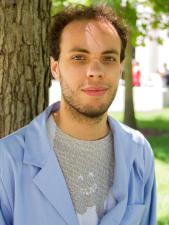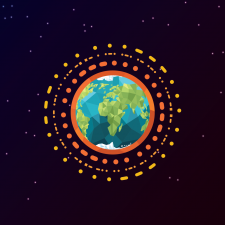
As a sociology major, a question I often think about in my studies is how to meaningfully change people’s behavior. In my sociology classes, we frequently analyze large-scale social issues and discuss the ways that they’re enforced through day-to-day interactions and behaviors. However, it can be difficult to move beyond that analysis into tangible change. Because of that, I’m excited to be spending the summer as a Fourcast Intern at UChicago’s Fourcast Lab, through which I’m getting the opportunity to apply what I’ve learned in the context of climate change intervention. And I get to wear a cool blue lab coat!
Fourcast Lab is a transdisciplinary collective at UChicago working on the problem of the SPORE device and the Terrarium, as discussed in this video with 30+ faculty and staff. Last spring, many students and faculty on campus received transmissions (computer glitches, cryptic emails, phone calls, etc.) that several have claimed were communications from the year 2049. Regardless of the truth of those theories, the transmissions created an excitement and energy on campus that, as a Fourcaster, I’ve been working to channel towards building a better future through a variety of approaches to addressing climate change. This work has taken two primary forms: First, I’m working on the Futures Design Challenge, through which teams of incoming first-year students will pitch an intervention to climate change for the chance to win a cash prize. Second, I’m encouraging people to engage with a connection to 2049 that we’re expecting to open on Monday, July 15 at exactly 2:30 PM CST on Twitch.

I’m not a climate scientist, and I was a little worried at first because while I’ve long been concerned about climate change and its global ramifications, I wasn’t sure what I could do as someone oriented more towards the social sciences and humanities. But the Fourcasters have been very welcoming, and in my time here so far, they’ve made it clear that addressing climate change is an interdisciplinary project. Tackling the problem certainly involves scientists and engineers, but it also involves writers to engage people with the topic, artists to produce innovative designs, policymakers and activists to implement ideas, and contributions from just about every other discipline. It’s been really interesting to see how a group of faculty and interns with many different backgrounds and interests can collaborate on this inherently multidisciplinary project, complementing and building off each other with their varied perspectives.
I’m loving my internship at Fourcast Lab and look forward to seeing what the summer has in store!